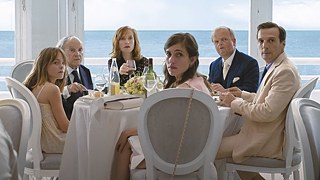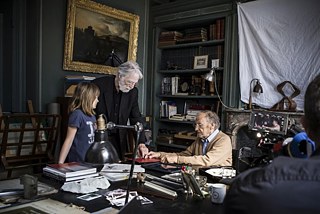Sydney Film Festival 2017
Happy End: Where Happiness is relative

Perhaps the greatest trick Michael Haneke continually pulls is his most obvious one. 28 years and twelve features into his filmmaking career, the Munich-born Austrian director has perfected the art of bleak portraiture. Displaying formal command and corralling finessed performances to match, he has carved a specific niche, mastering the art of restrained dramas that lay bear humanity's true nature.
Patient yet probing, his films pulse with the unease of watching and waiting for life, and people, to take an inevitable turn into darker territory. Appearing to proceed with care but valuing portrayals that slowly throw caution to the wind, his work burrows into the inner desires, thoughts, urges, actions and reactions most dare not admit or discuss. Haneke doesn't judge, but instead presents, demonstrating how even the most routine circumstances can prove insidious: upper-class living, a family visited by strangers, children growing up or the elderly facing the end of their lives, for example.
Retracing Haneke’s footsteps
All four feature in Happy End, an effort with a moniker designed to raise a smile; if there’s one thing that the mind behind Funny Games, The Piano Teacher, Cache, The White Ribbon and more isn’t known for, it’s bringing his films to an upbeat conclusion. That wry titular acknowledgement is emblematic of a movie that knowingly skirts the line between greatest-hits package and culmination of the writer/director’s output to date. It’s easy to feel as though Haneke is retracing his own footsteps, and he is, but he’s doing so with purpose and self-awareness.When her mother is hospitalised following what looks like a deliberate overdose, nearly-13-year-old Eve Laurent (Fantine Harduin) is sent to stay with her father and his relatives in their sprawling Calais estate. The stately manor's inhabitants don't just include her doctor dad Thomas (Mathieu Kassovitz), his new wife Anaïs (Laura Verlinden) and their infant, but her 85-year-old dementia-addled grandfather Georges (Jean-Louis Trintignant), newly appointed family construction company head Anne (Isabelle Huppert) and her agitated adult son Pierre (Franz Rogowski), and live-in Moroccan caretaker Rachid (Hassam Ghancy) and his cook wife Jamila (Nabiha Akkari).
Blunt and Subtle
Secrets, anxieties, hidden needs and the unexpected accoutrements of privileged lives: all stew and simmer, ready to send the big yet far from harmonious household crumbling like a wall of rock at a building site. In fact, a wall of rock at one of their company’s building sites does just that, with Haneke happy to be both blunt and subtle. The notion that he’s being playful in his splashes of blatancy can’t shaken, including when his Amour star Trintignant delivers lines that link Happy End with its predecessor. It mightn’t always make for a wholly satisfying end result, in the way commonly seen whenever filmmakers rely upon their established trademarks a little too heavily, but the director makes a valid point. In his films and in life alike, escapable miseries can only repeat.
Add the ample assistance of his excellent ensemble cast — particularly the scene-stealing trifecta of Trintignant, Huppert and the young Harduin — and Happy End becomes what most of Haneke’s output strives for: a snapshot both relatable and teeming with unspoken distress. It’s here that the film’s title feels not just winking but fitting, illustrating that happiness is relative. After all, sharing the same fortunes as the Laurent clan remains preferable to most of his finales.